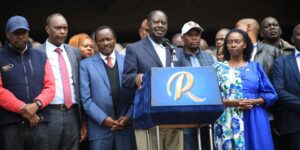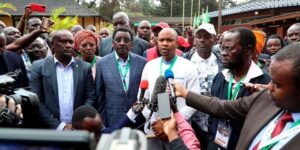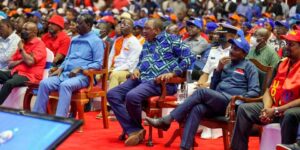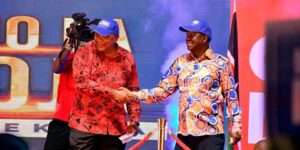Opposition leader Raila Odinga reportedly became dismissive of concerns about possible electoral fraud after he was allegedly made comfortable with assurances of a win because the State machinery would ensure his victory was not snatched, his chief agent in the polls, Mr Saitabao Ole Kanchory, has said in his tell-all book titled “Why Baba is not the 5th”.
Mr Kanchory has also laid bare in the book the intrigues that led to the naming of Ms Martha Karua as Mr Odinga’s running mate. He reveals that Mr Odinga defied then President Uhuru Kenyatta in picking her.
But the positive reaction among women that was triggered by her selection as the first female running mate to a serious contender in a presidential race made Mr Kenyatta change his mind and embrace her.
“Picking Martha was, to my knowledge, the only time Baba defied Uhuru Kenyatta and Junet Mohammed, both of whom were strongly opposed to the idea of the iron lady deputising a mellowed Raila Odinga,” he reveals in his book.
He says Ms Karau’s pick was made easier by her decision to join the coalition through the Orange Democratic Movement (ODM) side (which Mr Odinga leads) as opposed to the Jubilee Party wing of the coalition (which was captained by Mr Kenyatta).
“Martha’s entry into the scene turned out to be the real shot in the arm for then somewhat lukewarm Azimio [la Umoja One Kenya Coalition Party] campaigns. Realising the effects Martha was having, particularly in Mt Kenya and among the womenfolk, President Kenyatta grudgingly accepted her and even tried to belatedly claim credit for her selection,” adds the book.

Angling for the position
Mr Kanchory, however, does not talk of Mr Kenyatta’s preferred running mate to Mr Odinga. Apart from Ms Karua, Wiper Democratic Movement party leader Kalonzo Musyoka, 2013 presidential candidate Peter Kenneth, Kanu boss Gideon Moi and ODM deputy party leader Hassan Joho were some of the individuals who were angling for the position.
Other candidates who were interviewed included nominated MP Sabina Chege, then Kitui Governor Charity Ngilu and Mr Stephen Kipkiyeny Tarus of the National Liberal Party.
In the book, Mr Kanchory talks of how Mr Odinga was made to forget his past “painful experience” with the Independent Electoral and Boundaries Commission (IEBC) after he was convinced that its chairman, Mr Wafula Chebukati, would require the concurrence of the other six commissioners before declaring the winner in the presidential election.
Four out of the seven IEBC commissioners — vice chair Juliana Cherera and commissioners Francis Wanderi, Irene Masit and Justus Nyang’aya — were hired when Mr Kenyatta and Mr Odinga were working together under the famous March 8 “Handshake”, in what could have created an illusion within Mr Odinga that he was in good terms with the new team.
Mr Kanchory reveals in his book that detailed the intrigues and power struggles within the Azimio coalition and how his attempts to flag out alleged irregularities around IEBC operations were dismissed by Mr Odinga and some of his close allies.
“Even with his painful experience with stolen elections and the clear tell-tale signs and warnings on IEBC, Raila Odinga could not see how the election could possibly be stolen from him this time round. Apparently, someone had convinced the former Prime Minister that he had nothing to fear as far as the IEBC chairman Mr Wafula Chebukati was concerned,” Mr Kanchory says.

And in what lends a lot of credence to part of the coalition’s grounds to its presidential petition at the Supreme Court, Mr Kanchory says, Mr Odinga believed the outcome would only be valid if backed by a majority of the seven commissioners.
“According to the information that Baba had been given, all decisions of IEBC, including the final outcome of the presidential election, had to be subjected to a plenary of all the seven commissioners. Despite his constitutional mandate as the National Returning Officer, the chairman of IEBC could not act unilaterally in announcing the winner of the presidential contest,” the book states.
Dramatic disintegration
Moments before the outcome of the August 9 polls were declared at the Bomas of Kenya by Mr Chebukati, the four IEBC commissioners — who have since left office through resignation (Mr Wanderi, Nyang’aya and Cherera) and through removal by a tribunal (Ms Masit) — held a surprise press conference at the Serena Hotel in Nairobi that would signal a dramatic disintegration of the commission.
The split would later form a key component of the presidential petition. But the Supreme Court dismissed the charge, citing lack of evidence that the results were compromised by Mr Chebukati.
The court, however, found that the chairman cannot arrogate to himself the power to verify and tally results of a presidential election to the exclusion of other commissioners.

“The four commissioners have not placed before this court any information or document to show that the results were compromised or that the results would have substantially differed from that declared by the chairperson,” the apex court ruled.
On July 10, barely a month to the polls, Mr Kanchory says that Ms Ngilu and himself arranged for a meeting with Mr Odinga at Serena Hotel over alleged skewed “deployment of partisan returning officers and plans to use defective Kenya Integrated Election Management System (Kiems) to suppress voter turnout in Opposition strongholds.
“After the Serena meeting with Baba [Mr Odinga], Junet pulled me aside and told me ‘wewe Kanchory wacha wasi wasi. Nauwache hii kelele mingi…Chebukati hapana mtu mbaya’,” he narrates in the book.
He claims that some of the poll rigging loopholes allegedly created by the electoral body were flagged out by an unnamed foreign mission.
This assertion effectively casts doubt on the coalition’s sustained narrative that the international community sided with President William Ruto in the run-up to the August 9 polls.
“Strangely enough, some of the warnings on IEBC that Baba ignored reportedly came from highly placed sources at some of the foreign missions. That is why it is hard to believe that there was a general conspiracy against Baba [within] the international community,” the book states.
Mr Kanchory further states that Mr Odinga could have lost for “dismissing and disregarding all the intelligence that was shared with him”.
He describes President Ruto as a keen listener, who is ready to reach out. He says this attribute could have worked wonders for Dr Ruto even among the poll officials and at the Supreme Court, which upheld his election.

“Baba’s dismissiveness and his innate inability to reach out is definitely a handicap. This is another area where William [President Ruto] pulls a fast one on Raila Odinga. Reaching out is a sign of respect and recognition, which is something everyone desires, and the person who reaches out more will generally get more out of people. This soft spot power could very well have made a difference in a number of areas, including IEBC and even the Supreme Court,” he says.
An elaborate scheme
He talks of an elaborate scheme by key players in the Azimio campaign team that was designed to have Mr Odinga lose in the polls by making him feel that “he could not lose the election and that government machinery could not allow the election to be stolen from him.”
“Deception was the name of the game and some of us knew that, if only we could awaken Baba from the utopian slumberland in time, the ploy would be foiled and his presidential bid saved,” he observes.
But despite the possible loopholes and the general disorganisation and infighting at the coalition’s command centre, Mr Kanchory believes that Mr Odinga won.
He says that, according to Azimio’s tabulation of the results that were being publicly announced by IEBC, Mr Odinga had maintained a slight lead until the morning of August 15.
At this time, he says, only results from 27 constituencies were yet to be announced. Out of the 27, 20 were perceived as Azimio strongholds. Mr Kanchory says it is on the basis of these results that the coalition was confident of a win until the last minute.
A majority of Azimio politicians trooped to Bomas on the day the results were set to be announced.
Most of them were captured by cameras while in high spirits, once in a while joining the choir at the national tallying centre in a dance.
It was the same mood for Kenya Kwanza Alliance politicians, in what threw the nation into a state of confusion.
The opposition politicians would later walk out when Dr Ruto’s mother and other family members walked in. This was the clearest sign the commission was about to declare him President-elect.
“It was thus inconceivable to us how Raila Odinga would be overtaken once these constituencies were included. This is why the Azimio team at Bomas remained confident until the very last minute despite the challenges we had with agents’ management,” says Kanchory.
Mr Kanchory — a lawyer — also reveals that, in the entire period when the drama was unfolding at the Bomas of Kenya, Mr Odinga and Ms Karua were watching TV to catch up with the happenings at the national tallying centre.
“Immediately after my ordeal at Bomas — dishevelled and distraught — I called Mr Odinga who told me to find him at the Azimio Media Centre located in Karen. Upon my arrival, I was shocked to find Baba, Martha, [presidential campaign spokesperson] Makau Mutua, [Central Organisation of Trade Unions Secretary-General] Francis Atwoli and others watching the Bomas circus on television,” he says.
“I wondered how anyone in our camp — much less Baba and his high command — could at this time afford to sit and watch TV, let alone the Bomas proceedings,” Mr Kanchory says.
Credit: Source link